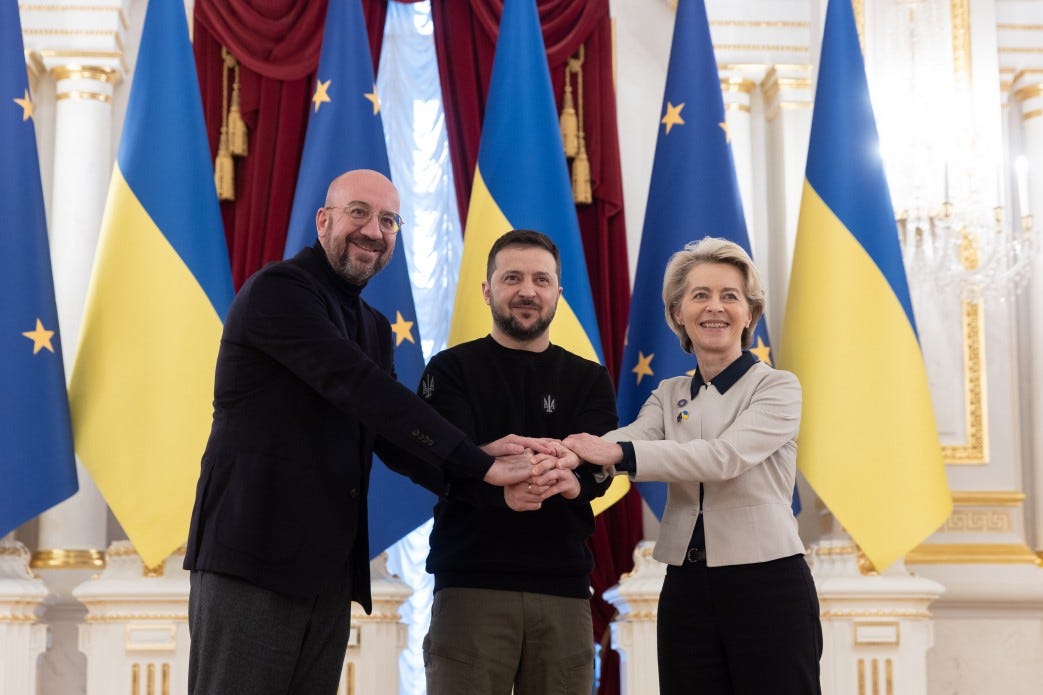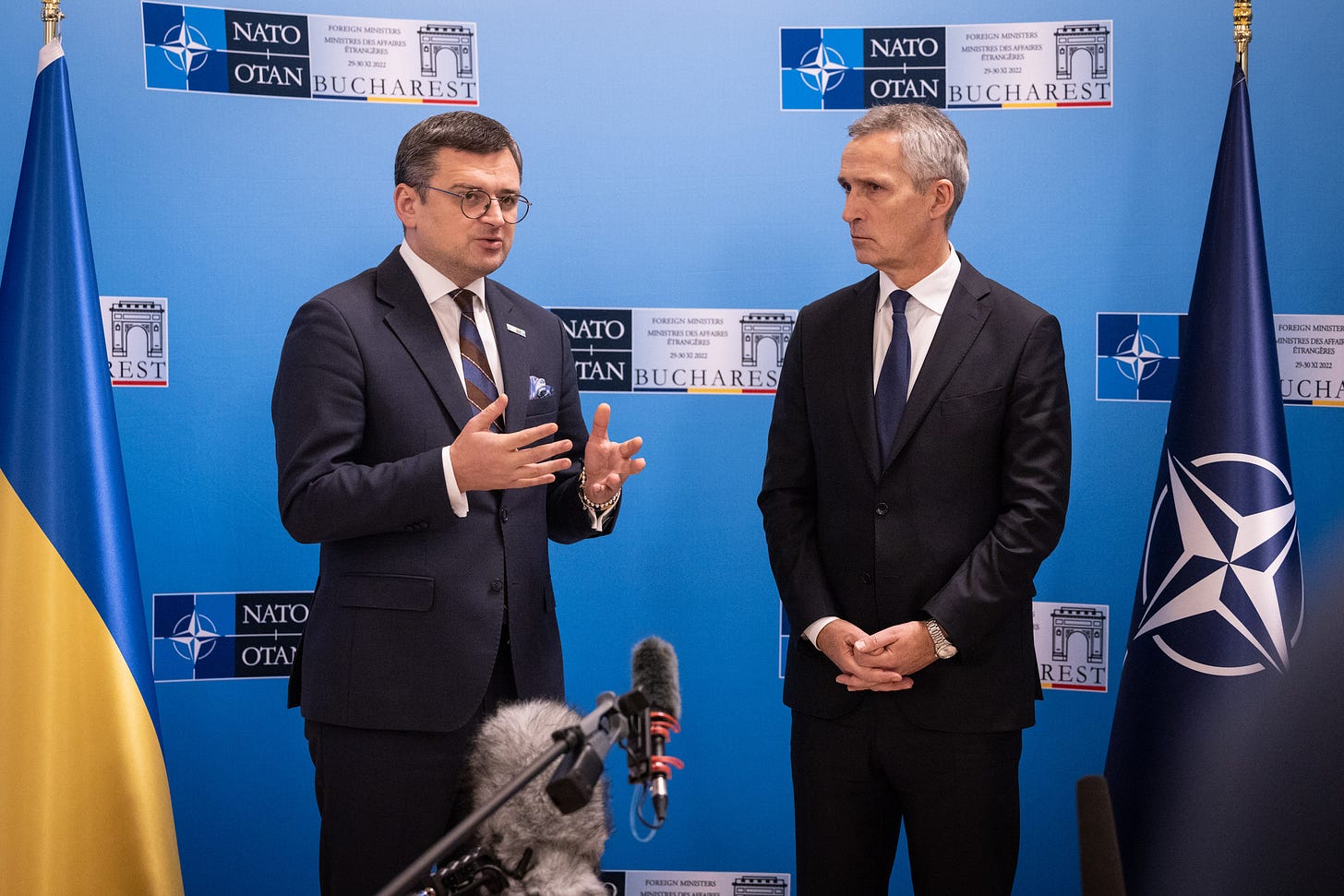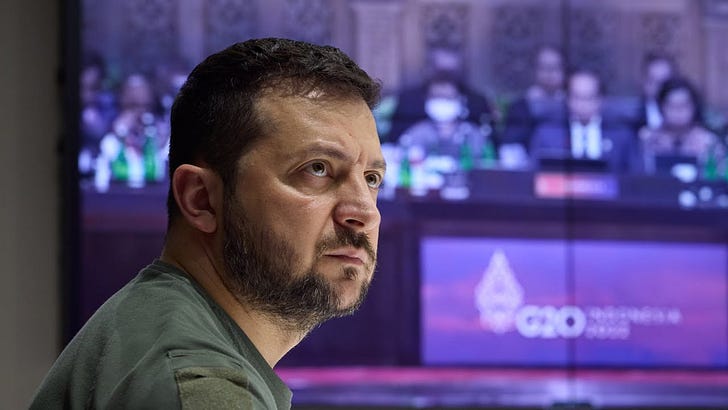Preparing for Peace in Ukraine
The World Must Embrace Zelenskyy’s Peace Proposal and Peace Summit
Most people around the world want peace in Ukraine. President Zelenskyy has taken the first step towards this goal, and outlined a ten-point peace settlement proposal. He has also called for an international peace conference to discuss the plan. Last week, European Union officials visiting Kyiv endorsed both the proposal and the summit. With greater vigor, the rest of the world should follow suit. President Biden should also acknowledge this peace plan and lead the rest of the world in organizing this peace conference, as well as taking other steps towards post-war justice and reconstruction. Zelenskyy has offered a starting point. We should assist in turning the proposal into reality.
The ten-point peace plan of President Zelenskyy is as follows:
1. Radiation and nuclear safety.
2. Food security.
3. Energy security.
4. The release of all prisoners and deportees.
5. Implementation of the United Nations Charter and restoration of Ukraine’s territorial integrity and the world order.
6. The withdrawal of Russian troops and cessation of hostilities.
7. Justice – by establishing a Special Tribunal regarding the crime of Russia’s aggression against Ukraine and an international mechanism to compensate for all the damages caused by the war.
8. The prevention of ecocide: the need for immediate protection of the environment.
9. The prevention of escalation by effective security assurances, for which Ukraine has put forward the Kyiv Security Compact proposal.
10. The confirmation of the end of the war by a jointly signed document.
Russian propagandists, as well as skeptics in the West, have denounced Zelenskyy’s plan as impractical because it does not offer Putin any concessions. But why should Zelenskyy offer Putin any concessions, especially at the beginning of a negotiation? Putin started this barbaric, unnecessary war. He is now losing, which he understands (more on this here.) Did Stalin, Roosevelt, and Churchill offer Hitler face-saving “off ramps” in 1943 after Germany lost the Battle of Stalingrad? Did the U.S.-led coalition of countries that pushed Saddam Hussein out of Kuwait in 1991 offer to give the Iraqi dictator twenty percent of the country he tried to annex in the pursuit of peace? Zelenskyy’s plan may not be the end point of a peace settlement, but it most certainly is a logical beginning. If Putin doesn’t like Zelenskyy’s ideas, he should publish his own proposal. To date, he has not done so.
When endorsing Zelenskyy’s peace plan and the idea of organizing a conference, Western leaders should refrain from undermining Zelenskyy’s negotiating leverage by publicly suggesting their ideas for compromises and peace settlements. Ultimately, it is only Zelenskyy, the Ukrainian parliament, and the Ukrainian people who have the authority to decide whether to agree to concessions or not. Right now, they are focused on liberating their entire country from Russian occupation. For Ukrainians, this remains the number one priority. And it should be for their international supporters, too.

Even if Zelenskyy and Putin succeeded in signing a peace agreement this year, the issue of sustainable security will remain. Several initiatives toward that goal should be started now.
First, the international community should begin now establishing the mechanisms for holding war criminals accountable. European Commission President Ursula von der Leyen’s plan to establish a special international tribunal to prosecute Russians for their war crimes, recently supported by the German Foreign Minister Annalena Baerbock, is a welcome sign. Ukraine, the European Union, and the Netherlands have also already backed the idea of a special tribunal.


Second, leaders of the world must think more creatively about how to work together to help rebuild Ukraine after the war. A few weeks ago, the European Union, G7, International Monetary Fund (IMF), World Bank, the European Bank for Reconstruction and Development (EBRD), and European Investment Bank (EIB) came together to announce the launch of a new Multi-agency Donor Coordination Platform for Ukraine. This is a good first step, but only a first step. Next steps must include the creation of new funding streams, including the confiscation of frozen Russian Central Bank assets held in the West, the transfer of wealth from Russian oligarchs, and eventually reparations to be paid by the Russian government. Western and Ukrainian leaders must give special attention to creating ways for Ukrainian civil society to be involved in the decision-making about and monitoring of reconstruction spending. In fact, to do this giant task right, a coordination platform may not be enough. Maybe a new international agency should be created from scratch, complete with a new international advisory board to (1) monitor progress and spending, (2) liaison between the government of Ukraine and the international donor community (3) interface private sector actors, and (4) provide a special new emphasis on transparency, decentralization, and the strengthening of democratic institutions to create the permissive conditions for effective rebuilding.
Third, the day after the war ends, the United States and NATO must immediately begin rebuilding and strengthening Ukraine’s armed forces. Henry Kissinger, one of the most vocal critics of NATO expansion, recently wrote, “Ukraine has acquired one of the largest and most effective land armies in Europe, equipped by America and its allies. A peace process should link Ukraine to NATO, however, expressed. The alternative of neutrality is no longer meaningful, especially after Finland and Sweden joined NATO.” On this issue, Kissinger is right. NATO should build that link as deeply and quickly as possible right after the war. The best way to deter future Russian military attacks is by arming and training the Armed Forces of Ukraine to the fullest capacity.

Finally, once the ward ends, Biden and European leaders should propose a multilateral negotiation to enhance European security more broadly. Before the war started, I outlined some ideas for such a negotiation in Foreign Affairs, calling it Helsinki 2.0. (Check it out here!) While Putin remains in power, it is hard to see Russia playing a constructive role in any dialogue about European security. But any negotiations about a new European security architecture will take years to conclude, so better to start now, even without Russia for the time being.




I still keep coming back to this idea of what a Russian defeat looks like. The war is fought completely so far in Ukraine so the physical and psychological scars are there more than in Russia. We can’t say all because clearly the families of dead Russian soldiers are suffering. If it ends with a negotiated peace with Putin in power, I am not sure how anyone rests easy. He might bide his time until the world is distracted by balloons and go again. However, whether he is there or not might not be that relevant. I would really like know where the Russian people stand. The Russians I know are against it, but they are mostly academics. Even if Putin is gone, is there a will among the Russian people and perhaps a future leader to continue this war? Zelensky’s plan is excellent and McFaul’s evaluation and advice are spot on... I just get a weird feeling that this is bigger than Putin...
All good ideas - especially the confiscation of Russian assets to pay for the destruction they've wrought- but first things first. Let's give Ukraine everything it needs to get the Russians out of Ukraine.